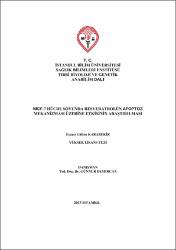MCF-7 HÜCRE SOYUNDA RESVERATROLÜN APOPTOZ MEKANİZMASI ÜZERİNE ETKİSİNİN ARAŞTIRILMASI
Künye
Karabekir G. (2017) MCF-7 HÜCRE SOYUNDA RESVERATROLÜN APOPTOZ MEKANİZMASI ÜZERİNE ETKİSİNİN ARAŞTIRIMASI. Yayımlanmamış yüksek lisans tezi. İstanbul : İstanbul Bilim Üniversitesi, Sağlık Bilimleri Enstitüsü.Özet
Meme kanseri dünyada kadınlar arasında en çok görülen malign tümördür. Kadınlarda görülen tüm kanserlerin %30’unu oluşturmaktadır. Tüm jinekolojik tümörlerden meme kanseri 3 kat daha yaygındır. Kanser sadece bir sağlık sorunu değildir. Sosyal ve ekonomik olarak da bir toplum sorunudur. Bu son derece önemli sağlık sorununa çözüm bulmak bir çok araştırmacı için ilk hedef olmuştur. Farklı maddelerin bu hastalık üzerindeki etkileri için tedaviye yönelik çalışmalar yoğun olarak araştırılmaktadır.
Kanser tedavilerinde kullanılan çeşitli bitkisel maddeler, hücre proliferasyonunu engellemeleri ve buna karşılık apoptozu tetiklemeleri nedeniyle kullanılmaktadırlar.
Çalışmamız da in-vitro ortamda doğal polifenolik bir bileşik olan resveratrolun MCF- 7 meme kanseri hücre hattı üzerindeki sitotoksik etkisini araştırmayı amaçladık.
Çalışmalarımızda, hücrelere verilecek olan resveratrol dozları MTT analizi ile belirlenmiştir. MTT analizi ilk olarak Mosmann tarafından geliştirilmiştir, ardından Alley ve ark. tarafından uygulanmıştır. Bu yöntemde 3-(4,5-dimethylthiazol-2-yl)-2,5- diphenyltetrazolium bromide (MTT) ile hücre canlılığı tespit edilmiştir. 12, 24 ve 48 saat süreyle 100 ve 250 μM resveratrol ile inkübe ettiğimiz MCF-7 hücrelerinden elde ettiğimiz MTT sonuçlarından, resveratrolun artan konsantrasyonu ile doğru orantılı olarak hücre yoğunluğunun kontrol grubuna göre azaldığı tespit edildi.
MTT analizlerinde, kontrol grubuna göre %50 absorbans azalmasına yol açan resveratrol dozu (IC50) sitotoksik doz olarak belirlenmiştir. Analizlerde 12. saatte ölçülen sitotoksik doz 250-500 μM arasında, 24. saatteki ölçümlerde 100-250 μM arasında, 48. saatteki ölçümlerde ise 100 μM olarak belirlenmiştir.
2
Çalışmalaramızdan elde edilen Anneksin V Flow-Sitometri ölçüm sonuçları değerlendirildiğinde; MCF-7 hücrelerine verilen 100 ve 250 μM resveratrolün kontrol grubuna göre erken apoptozu arttırdığı gözlemlenmiştir. Özellikle 48 saat sonunda erken apoptozis yüzdesinin kontrol grubuna kıyasla fazla oranda arttığı görülmüştür.
Resveratrol’un kontrol grubuna göre, MCF-7 hücrelerinde apoptozu arttırıcı etki gösterdiği ve hücre poliferasyonunu azalttığı gözlemlenmiştir. Faz kontrast mikroskobunda yapısal değişiklikler izlenmiş ve fotoğraflanmıştır.
Sonuç olarak, resveratrolun tüm bu antikanser etkilerinden biri olan apoptotik etkisi hem doz hem de zamana bağlı olarak MCF-7 meme kanseri hücre soyunda özellikle erken apoptozu indüklediği gözlemlenmiştir. Breast cancer today is the most common malignant tumor amongst women worldwide. It alone makes up the 30 % of all malignancies in women. Breast cancer is 3 times more common than the rest of all gynecological cancers. It is so presenting not just a major health problem for our modern society but also a significant social and economic dilemma. Being a major current socio-economical-medical problem to tackle, the disease has been a priority of research that aims the early diagnosis and more efficient treatment methods, in particular better chemotherapeutic agents.
Various plant based chemicals are used in cancer therapy to prevent cell proliferation while triggering apoptosis.
In the lights of existing knowledge and experience, our study aimed the evaluation of the selective cytotoxic effect of resveratrol, a polyphenolic phytonutrient agent, on MCF-7 type breast cancer cellsin an invitro environment.
In our work we determined the dose of resveratrol by carrying out MTT analysis. MTT {3-(4,5-dimethylthiazol-2-yl)-2,5-diphenyltetrazolium bromide} assay, which was first used by Mosmann and further developed by Alley and collegues, is a practical test used to determine cell viability. The right dosaging of resveratrol was determined after MCF-7 cells were incubated with 100 and 250 μM of resveratrol for 12, 24 and 48 hours. We found that cell density decreased compared to the control group in increasing concentrations of resveratrol.
MTT analysis helped us identify the cytotoxic concentration of resveratrol that decreases the absorbance of cells by 50% (IC50) compared to the control group. Different
4
incubation times led to different cytotoxic doses such as 250-500 μM, 100-250 μM, 100 μM after 12, 24 and 48 hours, respectively.
When the Annexin V Flow-Cytometry results are taken into consideration, it was observed that resveratrol concentrations between 100- 250 μM increased apoptosis in MCF-7 cells compared to the control group. Especially after 48 hours percentage of apoptosis was shown to be significantly higher compared to the control group.
According to our results resveratrol significantly increased apoptosis and reduced proliferation in vitro compared to the control group. Structural changes were observed and documented with a phase contrast microscope.
In conclusion, resveratrol was shown to have anticancer properties such as triggering early apoptosis via a time and dosage dependent manner in MCF-7 breast cancer cells.


















